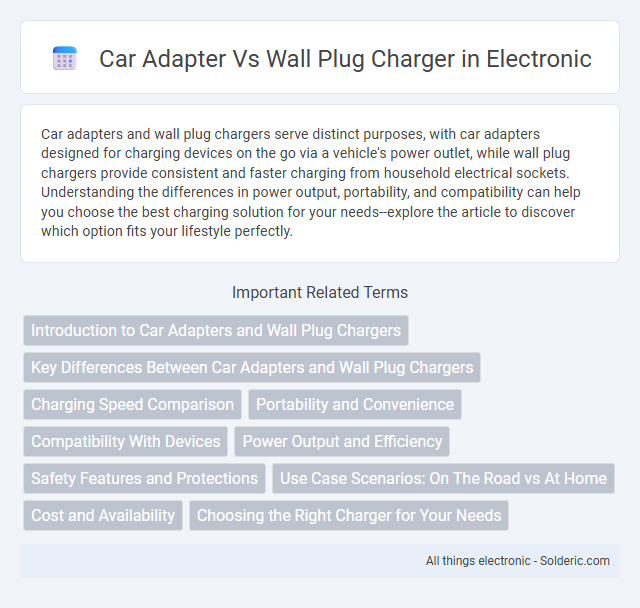Car adapters and wall plug chargers serve distinct purposes, with car adapters designed for charging devices on the go via a vehicle's power outlet, while wall plug chargers provide consistent and faster charging from household electrical sockets. Understanding the differences in power output, portability, and compatibility can help you choose the best charging solution for your needs--explore the article to discover which option fits your lifestyle perfectly.
Comparison Table
| Feature | Car Adapter | Wall Plug Charger |
|---|---|---|
| Power Source | Vehicle 12V-24V DC socket | Standard AC outlet (110V-240V) |
| Portability | Compact, designed for on-the-go use | Stationary, best for home or office |
| Charging Speed | Slower, limited by car power system | Faster, higher power capacity |
| Compatibility | Mostly USB-based devices | Wide range including USB, USB-C, and proprietary chargers |
| Voltage Output | Typically 5V DC output | Varies; commonly 5V, 9V, 12V with fast charging |
| Usage Environment | In-car charging only | Indoor charging at home or workplace |
| Price Range | Affordable ($5-$20) | Varies ($10-$50+) |
Introduction to Car Adapters and Wall Plug Chargers
Car adapters are designed to power and charge devices through a vehicle's 12V cigarette lighter socket, offering convenience for on-the-go energy needs. Wall plug chargers connect directly to household electrical outlets, providing stable, faster charging for your devices with greater wattage capacity. Choosing the right charger depends on your mobility requirements and the device compatibility with either the car adapter or wall plug charger.
Key Differences Between Car Adapters and Wall Plug Chargers
Car adapters typically operate within a vehicle's 12V DC system, providing a convenient power source on the go but often with lower charging speeds compared to wall plug chargers. Wall plug chargers connect directly to AC outlets, offering higher voltage and faster charging capabilities ideal for home or office use. The key difference lies in their power input source and output efficiency, affecting charging speed, compatibility, and portability.
Charging Speed Comparison
Car adapters typically offer charging speeds ranging from 12W to 40W, limited by vehicle power output and USB port specifications. Wall plug chargers often provide higher wattage options, commonly reaching 60W to 100W or more, enabling significantly faster device charging. The difference in charging speed influences battery replenishment efficiency, with wall plug chargers favoring rapid charging for most smartphones and laptops.
Portability and Convenience
Car adapters offer unmatched portability by allowing you to charge your devices directly from your vehicle's 12V power socket, making them ideal for travel or on-the-go charging. Wall plug chargers, while less portable due to their reliance on fixed power outlets, provide consistent and faster charging speeds suitable for home or office use. Your choice depends on whether you prioritize convenience during travel or optimal charging performance at stationary locations.
Compatibility With Devices
Car adapters typically offer USB ports compatible with a wide range of devices, including smartphones, tablets, and GPS units, enabling charging on the go. Wall plug chargers often provide higher power outputs and support fast charging protocols like USB Power Delivery or Quick Charge, making them ideal for powering modern devices quickly. Compatibility depends on output voltage, amperage, and connector type, with many wall chargers supporting multiple device standards compared to some car adapters.
Power Output and Efficiency
Car adapters typically offer lower power output compared to wall plug chargers, often maxing out around 12-18 watts, while wall chargers commonly provide 20-65 watts or more, enabling faster device charging. Wall plug chargers utilize a more stable electrical source, resulting in higher efficiency and consistent power delivery, whereas car adapters may fluctuate due to varying vehicle voltage. Choosing the right charger impacts how quickly and efficiently your devices recharge during travel or at home.
Safety Features and Protections
Car adapters and wall plug chargers both incorporate essential safety features such as overcurrent, overvoltage, and short-circuit protection to prevent damage to devices and power sources. Wall plug chargers typically offer more robust thermal management and surge protection due to their stable AC power input, whereas car adapters must handle voltage fluctuations from a vehicle's electrical system, often including built-in voltage regulators and fuses. Evaluating products with certifications like UL, CE, or FCC ensures adherence to safety standards, critical for both charger types to protect users and devices effectively.
Use Case Scenarios: On The Road vs At Home
Car adapters excel during travel by allowing you to charge devices directly from your vehicle's power outlet, making them ideal for road trips, commuting, or any time you're away from home. Wall plug chargers provide faster and more stable charging suited for at-home use, ensuring your devices are fully powered overnight or during extended downtime. Your choice depends on whether you need portability and convenience on the road or consistent, high-speed charging in a fixed location.
Cost and Availability
Car adapters generally cost less than wall plug chargers due to simpler design and lower power output requirements, making them a budget-friendly option for on-the-go charging. Wall plug chargers offer wider availability in retail stores and online, with diverse options supporting faster charging and multiple devices. Your choice depends on convenience and budget, as car adapters suit travel needs while wall chargers provide versatility at home or office.
Choosing the Right Charger for Your Needs
Car adapters deliver convenient charging on the go by converting your vehicle's power supply to charge devices, ideal for road trips or daily commutes. Wall plug chargers offer faster, more stable charging directly from an electrical outlet, perfect for home or office use. Your choice depends on mobility needs and charging speed preferences, ensuring your devices stay powered efficiently wherever you are.
car adapter vs wall plug charger Infographic

 solderic.com
solderic.com